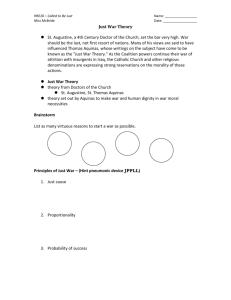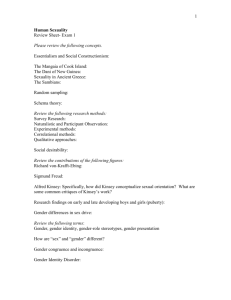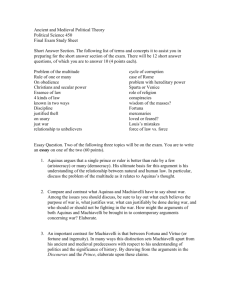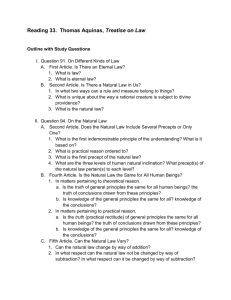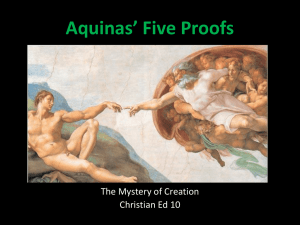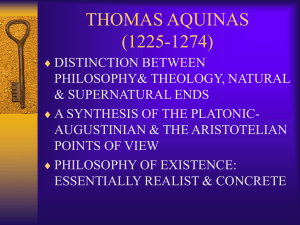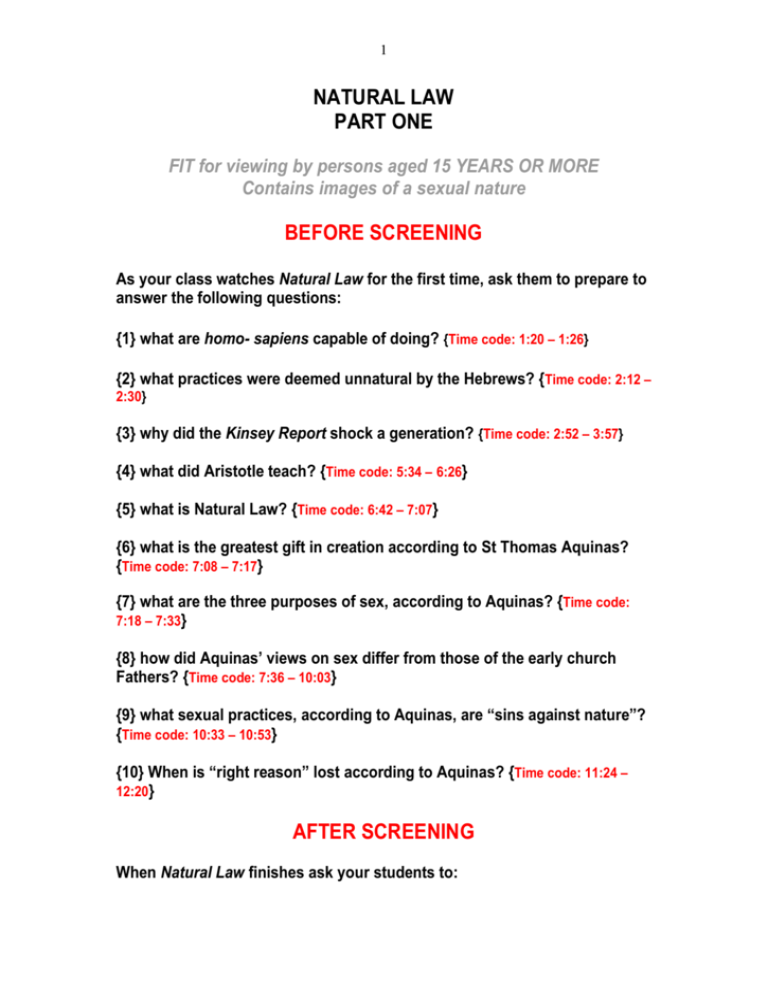
1
NATURAL LAW
PART ONE
FIT for viewing by persons aged 15 YEARS OR MORE
Contains images of a sexual nature
BEFORE SCREENING
As your class watches Natural Law for the first time, ask them to prepare to
answer the following questions:
{1} what are homo- sapiens capable of doing? {Time code: 1:20 – 1:26}
{2} what practices were deemed unnatural by the Hebrews? {Time code: 2:12 –
2:30}
{3} why did the Kinsey Report shock a generation? {Time code: 2:52 – 3:57}
{4} what did Aristotle teach? {Time code: 5:34 – 6:26}
{5} what is Natural Law? {Time code: 6:42 – 7:07}
{6} what is the greatest gift in creation according to St Thomas Aquinas?
{Time code: 7:08 – 7:17}
{7} what are the three purposes of sex, according to Aquinas? {Time code:
7:18 – 7:33}
{8} how did Aquinas’ views on sex differ from those of the early church
Fathers? {Time code: 7:36 – 10:03}
{9} what sexual practices, according to Aquinas, are “sins against nature”?
{Time code: 10:33 – 10:53}
{10} When is “right reason” lost according to Aquinas? {Time code: 11:24 –
12:20}
AFTER SCREENING
When Natural Law finishes ask your students to:
2
1. WRITE or SKETCH down the most memorable image that sticks in their
mind.
SHOW a friend their image and explain the reason why they chose it
DISCUSS what they consider to be the most important point in the film
REPORT their findings back to the rest of the class.
2. Think back over what they have just seen. If they were able to interview
one of the people in Natural Law, WHO would they most like to crossexamine?
WHAT would be the main question they would want to ask that person?
The key people mentioned in Natural Law are:
Alfred Kinsey: {1894 – 1956} American Professor and author of The Kinsey
Report
Aristotle {384 – 322 BCE}: Greek Philosopher
St Augustine: Early Church Father {4th century}
St Thomas Aquinas {1226 – 1274}: Christian Theologian
WRITTEN AND GROUP WORK FOR YOUR STUDENTS
{TO HAND OUT}
Here are ten statements:
{1} Incest is wrong
{2} Bestiality is wrong
{3} Homosexuality is wrong
{4} Masturbation is wrong
{5} Rape is wrong
{6} the only unnatural sex act is that which you cannot perform
3
{7} every thing that exists in the universe has a purpose
{8} the greatest gift in creation is the gift of reason
{9} the purpose of human beings is to exercise reason
{10} Sexual energy has immense potential to create and destroy
Make YOUR OWN list {1} to {10} writing down what YOU consider to be {1}
the most representative statement of Natural Law, working down to {10}
what you consider to be the least representative statement of Natural Law.
After you have finished compare, contrast and share the choices you have
made with TWO other people in your class. Be prepared to support your
choices, with reasons.
EXPLAIN to your friends, which, if any, of the statements you personally
disagree with.
Now exchange your views with other members of your class.
DISCUSSION
Split up into small groups. Each group is allocated one piece of writing.
You have THIRTY MINUTES to read, discuss and prepare a presentation on
your piece of writing to the rest of the class {including reading out your
quote}.
Ensure that as well as explaining the meaning and significance of your
allocated quote, your presentation includes your group’s views on the
subject too.
“In the beginning God created the heaven and the earth. And God said
let the waters bring forth moving creatures that have life. And male and
female created he them. And God blessed them saying be fruitful and
multiply. And God saw every thing that he had made, and behold, it was
very good.”
{Genesis, Chapter One}
“A man turns to good use the evil of lust, and is not overcome by it,
when he bridles and restrains its rage . . . and never relaxes his hold
upon it except when intent on offspring, and then controls and applies it
4
to the carnal generation of children . . . , not to the subjection of the
spirit to the flesh in a sordid servitude.”
{ST AUGUSTINE}
“To disparage the dictate of reason is equivalent to condemning the
command of God.”
{ST THOMAS AQUINAS}
“The only unnatural sex act is that which you cannot perform. People do
not represent two discrete populations, heterosexual and homosexual.
The world is not divided into sheep and goats. The world is a spectrum
of colors and varieties and possibilities in each and every one of its
aspects. The sooner we learn this concerning sexual behavior the
sooner we shall reach a sound understanding of the realities of sex.”
{THE KINSEY REPORT}
“The conflict between ethics and sex today is not just a collision
between our instinct and morality, but a struggle to give an instinct its
rightful place in our lives, and to recognize in this instinct a power which
seeks expression and evidently may not be trifled with, and therefore
cannot be made to fit in with our well-meaning moral laws. Sexuality is
not mere instinct - it is an indisputably creative power that is not only
the basic cause of our individual lives, but a very serious factor in our
psychological lives as well. Our civilization enormously understates the
importance of sexuality.”
{CARL GUSTAV JUNG}
SCRIPT
{To support extension work}
“In the beginning God created the heaven and the earth. And God said
let the waters bring forth moving creatures that have life. And male and
female created he them. And God blessed them saying be fruitful and
multiply. And God saw every thing that he had made, and behold, it was
very good.” {Genesis, Chapter One}
It’s only 250,000 years ago that a creature more human than ape
discovered to its amazement that it could survive on two legs. Our
ancestors, homo-erectus, vertical man, had arrived. Up to this point in
evolution, sexual relations had been similar to that of other creatures:
the female presented her rear to the male and intercourse was functional
and purposeful. But, with the arrival of vertical man, what was deemed
natural began to change.
As homo-erectus evolved into homo-sapiens – that is humans capable
of reasoning, language and introspection - it soon became apparent that
5
sex was not only an instinctive function but it was procreative and
reproductive too.
When our ancestors discovered that babies didn’t appear naturally like
the buds in spring but were a consequence of sexual intercourse,
attitudes to sex began to change – and - 5,000 years ago, as complex
and sophisticated human communities began to emerge, humans came
to realize that to live harmoniously together, certain boundaries about
what was sexually acceptable needed to be drawn – although what was
sometimes deemed natural then {like sacred prostitution or sex with boys!}
would be frowned upon today.
Two and a half thousand years ago, by the time of the Hebrews,
prescribed rules and regulations about what was acceptable and natural
were written down, and, practices deemed unnatural like incest,
homosexuality and bestiality became punishable by death – and what
was considered natural in terms of sexual activity came to be dominated
by these Biblical injunctions.
But, over the last sixty years or so, questions about what is natural in
terms of human sexuality have re-emerged.
In the 1940’s Alfred Kinsey, a biology professor at Indiana University in
America began interviewing tens of thousands of men and women about
their sex lives. Confronted by a generation not used to revealing their
private thoughts and feelings about sex this was no easy task.
To protect these intimate revelations Professor Kinsey encoded
peoples’responses so that personal identities would remain confidential
and anonymous.
Kinsey’s published research, the Kinsey Report, shocked America and
quickly became a best- seller. People brought up to believe that only
heterosexual sex within marriage was the norm were presented with a
different reality.
The Report revealed among other things that 10% of males were
homosexual for at least three years of their lives; that 26% of married
females had extramarital experiences at some time during their married
lives, that 90% of American men sometimes masturbated, and that 50%
of American men had been at one time or other unfaithful to their wives.
“The only unnatural sex act is that which you cannot perform. People do
not represent two discrete populations, heterosexual and homosexual.
The world is not divided into sheep and goats. The world is a spectrum
of colors and varieties and possibilities in each and every one of its
aspects. The sooner we learn this concerning sexual behavior the
sooner we shall reach a sound understanding of the realities of sex”.
{The Kinsey Report}
6
Sixty years on, people are generally more confident about expresssing
and sometimes celebrating their sexuality and although the Kinsey
Report may seem out of date to a generation brought up in a more
sexually flamboyant culture, it was groundbreaking in that it
acknowledged that all was not always as it seems in regards to peoples’
sexual behaviour.
By confronting subjects that were taboo Kinsey challenged the meaning
of terms like ‘abnormal’ and ‘unnatural’ and made a plea for greater
tolerance about the huge range of human sexuality.
Kinsey’s report however was not new in one way. Philosophers and
theologians going back to Ancient Greece, two and a half thousand
years ago, had always been interested in sex - not describing it as
Kinsey did but in prescribing what is right and wrong in relation to sex.
In the 4th century before Christ lived a philosopher whose thought was
to influence zoology, astronomy, philosophy, education, politics,
literature and theology.
Aristotle taught that every thing that exists in the universe has a
purpose and if it performs according to its natural, intended purpose,
then it becomes balanced and lawful and good. The way to find out what
that purpose is, according to Aristotle is to examine it and deduce from
the examination the reason for existence.
Aristotle believed that the purpose for humans is to exercise reason and
by becoming rational human beings we could find our purpose for
existence – and the pursuit of virtue is integral to this.
This teaching that everything in the universe has a purpose was to
influence one of the most dynamic and brilliant of Christian thinkers,
whose teachings still influence Christian thinking today.
St Thomas Aquinas taught that everything on earth and in heaven has
been created for a purpose.
This is Natural Law which is an Eternal law – it is absolute - always the
same at all times and in all places for all people. So going against this
purpose is opposing the Creator’s intention.
For Aquinas the greatest gift in creation is the gift of reason and by
using reason human beings can know their purpose in the created
order.
Aquinas taught that sex has three purposes: firstly to reproduce;
secondly, to provide pleasure to the participants and thirdly, to bind a
husband and wife together in unity.
7
When Aquinas taught that sexual pleasure was one purpose of sex his
views were condemned by the church as being too radical; a dangerous
position to be in during a period of history when the church treated
“heretics”, people who dissented from orthodox views, with secret
trials, torture and death by burning.
The 13th century church had been dominated for a thousand years by
the thought of the Early Church Fathers - St Augustine and St Jerome who had taught that sexual pleasure is sinful and the result of original
sin going back to the Fall of Adam and Eve in the Garden of Eden: a
view that generally regretted that we human beings are sensual
creatures capable of experiencing intense sexual pleasure.
Other Church Fathers called sex ‘filthy’, ‘degrading’, ‘shameful’, ‘a
defilement’ and ‘unclean’ - the guilt of the original transgression had
been transmitted and still persisted in humanity.
“A man turns to good use the evil of lust, and is not overcome by it,
when he bridles and restrains its rage and never relaxes his hold upon it
except when intent on offspring, and then controls and applies it to the
carnal generation of children, not to the subjection of the spirit to the
flesh in a sordid servitude”.
{St Augustine}
For St Thomas Aquinas however, sexual pleasure was a sacred gift – a
mystical union in which a person surrenders the most intimate part of
themselves to their lover and in turn experiences the ecstasy of love
moving in them as they move in love.
Aquinas’, by praising sexual pleasure, was in fact continuing a Biblical
tradition that went back over 2,000 years.
“Behold! Thou art fair my love, thou art fair! Thou hast doves’ eyes
beneath thy veil. Thy honeycomb lips are like threads of scarlet - honey
and milk are under thy tongue and thy speech is a delight. Kiss me with
the kisses of your mouth for your love is better than wine. Thy breasts
are twins of a gazelle among the lilies and the smell of thy garments is a
garden of frankincense and myrrh. Let me come to thy garden…for thou
hast ravished me with thy heart. Behold! Thou art fair my love, thou art
fair!!”
{Adapted from the Song of Solomon}
St Aquinas recognized the immense power of sexual energy – its
potential to create but its potential to destroy; and while teaching that
sexual pleasure is part of God’s purpose, he also taught that the
purpose of sexual pleasure needs to be balanced with the other
purposes of sex. To reap the benefits of the pleasure and the joy of sex,
human sexual expression needs ethical boundaries.
8
Aquinas also taught that there were ‘sins against nature” like
masturbation where two of the purposes of sex - procreation and
physical union remain unfulfilled; same sex relationships where
procreation is unfulfilled; bestiality where procreation and marriage are
not realized.
One of Aquinas’ primary precepts is to procreate – it is natural to want
to have sex. It’s an instinctive function; but to thwart this process with
contraception is to thwart the natural order of things - Natural Law.
“The exceeding pleasure experienced in the sex act, so long as it is in
harmony with reason, does not destroy the balance of virtue.”
{ST THOMAS AQUINAS}
‘Harmony with reason’, the virtuous purpose of sex according to
Aquinas’ Natural Law, is realized by seeking sexual pleasure,
simultaneously, with procreation, within marital unity.
If any one of these three purposes is lost – our sex lives, according to
Aquinas, become unbalanced - and therefore sinful - because ‘right
reason’ is lost.
Right reason is lost when people commit acts of rape or engage in
mechanical and loveless sex, or commit adultery or have sex outside of
marriage; acts which although they may fulfill two of the natural
purposes of sex, procreation and pleasure, fail to fulfill the third purpose
which is to bind a couple together in life-long union, man and woman in
a committed permanent relationship - Natural Law.
Natural Law
Part Two
FIT for viewing by persons aged 15 YEARS OR MORE
Contains images of a sexual nature
IT IS SUGGESTED THAT TEACHERS CAN EITHER SHOW EACH OF THE
THREE SHORT FILMS WITH THE ACCOMPANYING FILMED STUDENT
DISCUSSION, OR, PAUSE AFTER EACH SHORT FILM FOR THEIR OWN
CLASSES TO RESPOND.
The three short films explore:
1. Homophobia
{Time-code: 0:10 – 1:15}
9
2. Masturbation
{Time-code: 3:58 – 4:53}
3. Contraception
{Time-code: 6:02 – 6:28}
Each short film is followed with filmed discussion by A Level
Theology students at Hereford Sixth Form College.
SCRIPTS
OF THE THREE SHORTS
1.
“Homosexual acts are intrinsically disordered. They are
contrary to natural law”
{St Thomas Aquinas}
VOICEOVER OF GERRY FALWELL, EVANGELIST PREACHER, SPEAKING
THREE DAYS AFTER THE DESTRUCTION OF THE TWIN TOWERS IN NEW
YORK ON SEPTEMBER 11th 2001 {“9/11”}
“What we saw on Tuesday, terrible as it was, could be miniscule if in fact God
continues to lift the curtain and allow the enemies of America to give us what
we probably deserve. To the abortionists and the pagans, to the feminists, the
gays and the lesbians who are actively trying to make an alternative life style,
I point the finger in their face and say you helped this happen. We have
forsaken the fact that our laws come from the Bible and if we go back to the
Biblical standard our society will be gathered together in harmony and if we
don’t, this society is going to be shattered into a thousand little pieces”.
{Gerry Falwell, evangelist preacher}
2.
“All cases of masturbation are grave moral evils”
{Humanae Vitae, Papal Encyclical, 1968}
A Roman Catholic husband and wife have been trying for five years without
success to have children. When they read that a fertility treatment clinic has
just opened in their town they decide to pay it visit.
When they get there it is suggested that the husband might like to look at
some pictures of models to help him masturbate to produce the sperm
10
necessary to try and fertilize his wife’s egg. The husband finds himself in a
dilemma.
As, a practicing Roman Catholic, he is guided by the traditional teaching of
Natural Law which forbids masturbation as an unnatural misuse of the sex
organs but, he is also guided by another teaching of Natural Law which says
that a primary purpose of life is the continuation of the species.
3.
“The use of any method of contraception that thwarts the
natural power of sex to generate new life is strictly forbidden.
In such cases the conjugal act, deprived of its interior truth
because it is artificially deprived of its procreative capacity,
ceases, also, to be an act of love.”
{Pope Pious, XI}
Watchwords
The following words and phrases have been used in this film, sometimes
more than once. They are useful words and phrases to get to know. Knowing
what they mean will improve your general level of understanding and self
expression. You might know some of them but the ones you don’t, be sure to
check up on:
Incest; carnal; prescribing; chastity; integral; absolute;
concupiscence; The Fall; degrading; sensual; intrinsically;
procreation; Natural Law; virtue; fundamentalists; primary
purposes; relativistic ethics; deduce; conjugal.
© Joe Jenkins 2009
www.ethicsonline.co.uk
11

